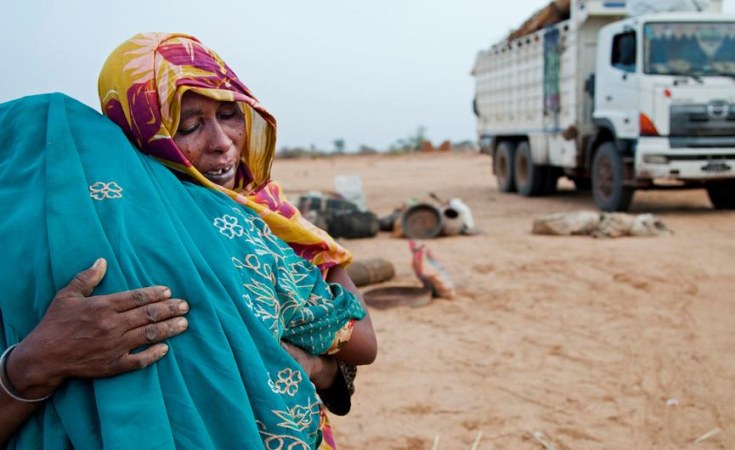Given the flawed Jeddah process, the AU and IGAD need a clearer role in the UN's transition mission.
Since civil war broke out in Sudan in April, approximately 10 000 people have died and six million Sudanese are displaced internally and across neighbouring countries - mostly Egypt, Ethiopia, Chad and South Sudan.
Indications are that clashes between the Sudanese Armed Forces (SAF) and the Rapid Support Forces (RSF) will be protracted as the two sides battle to take key towns and a crisis unfolds in Darfur.
So far, only the Jeddah process has produced tangible results in the search for peace. Talks started in May when partial ceasefires, tenuous and brief, were brokered by the United States (US) and Saudi Arabia. The Jeddah talks resumed in late October, with belligerent parties showing wavering political will to end the crisis. They committed to improving humanitarian access and assistance, and implementing confidence-building measures such as opening communication channels and reducing inflammatory rhetoric and disinformation.
In addition to the narrow focus of these objectives, another challenge is the lack of a clear and articulated African position in these talks. Responses from the African Union (AU) and East Africa's Intergovernmental Authority on Development (IGAD) have been inadequate from the start. Coordination and implementation among the various African initiatives established to resolve the conflict have been limited.
Belligerent parties have shown wavering commitment to negotiating an end to the crisis
The AU developed a roadmap for resolving the conflict, and set up the Expanded Mechanism to convene a core group of Peace and Security Council (PSC) member states, Sudan's neighbours and pivotal stakeholders. But the group hasn't officially met since May. For its part, IGAD created its own roadmap and brought together heads of state from Djibouti, Kenya, Ethiopia and South Sudan to engage the conflicting parties.
Neither the AU nor IGAD's disparate peace processes have achieved their primary objectives. These include providing an effective humanitarian response, protecting civilians and civil infrastructure, and arranging face-to-face meetings between the SAF and RSF leadership to find a political settlement.
Prospects for peace have been hampered by coordination and collaboration problems between the two entities and within the AU, a lack of resources and capacity, and poor leverage over the conflicting parties. Faced with these difficulties, and assurances from the US and Saudi Arabia, the Jeddah process has dominated peace-making efforts.
Although IGAD had initially called for a single IGAD-AU-led platform in line with African solutions to African problems, the regional body is now participating in the Jeddah talks for the first time 'on behalf' of the AU.
Given the failure of current negotiations, UNITAMS' mandate should be urgently reviewed and extended
It's unclear whether the AU and IGAD roadmaps were consolidated into a single position, and if such a position has been included in the Jeddah negotiations. The principles of subsidiarity seem to be misunderstood, as confusion persists about whether IGAD will drive its roadmap or serve as the AU's mouthpiece.
The impact of the Jeddah process is also unclear. The talks are a bilateral initiative influenced by the foreign policies and interests of the US and Saudi Arabia. A multilateral mechanism would be preferable, bringing global weight and resources, and informed by African voices. The United Nations Integrated Transition Assistance Mission in Sudan (UNITAMS) could fill that role.
UNITAMS was established in 2019 to provide oversight, assistance and support to Sudan's transition. But it has been largely discredited due to perceived biases among various Sudanese stakeholders. Eventually, contestations between the UN's Special Envoy and Secretary-General's Special Representative, Volker Perthes, and the de facto transitional authority head, General Abdel Fattah al-Burhan, culminated in the former being declared 'persona non grata' in Sudan.
Although Perthes resigned in September, UNITAMS' mandate was renewed by the UN Security Council until 3 December. Given that the US, Saudi Arabia and African actors have failed to secure a permanent ceasefire and course correct, UNITAMS' mandate should be urgently reviewed and extended beyond December.
The AU and IGAD could push for greater representation and decision making within UNITAMS
A benefit of UNITAMS is that it encompasses the AU and IGAD as actors on an equal footing. There were differences in approach in the UN-AU-IGAD trilateral mechanism, including how the partners wanted to oversee the transition. But the inclusion of the AU and IGAD was a result of their comparative advantages and a recognition of their roles in Sudan since 2019. In comparison, the AU and IGAD's involvement as co-facilitators of the Jeddah process seems more ad hoc.
The UN-AU-IGAD mechanism combines the legitimacy of African voices with the UN's capacity to implement results-yielding sanctions, with requisite leverage over the conflicting parties. In early October, the UN's Human Rights Council passed a resolution to set up a commission of inquiry to investigate war crimes and crimes against humanity in Sudan. None of the 19 countries that voted in favour were African. Several African countries voted against the resolution or abstained.
The AU, IGAD and their respective member states, could push for greater representation and decision making within UNITAMS. The recent announcement that Ramtane Lamamra, former Algerian foreign minister and past AU commissioner for peace and security, could replace Perthes as UNITAMS head, comes at a critical juncture.
This round of Jeddah talks provides an opportunity for the AU and IGAD to draft a comprehensive plan that guides their engagements and improves coordination on Sudan. The AU has a chance to concretely shape the peace process in terms of design, timing and outcome. The PSC's ministerial meeting on 15 November provides a platform to reconceptualise Africa's engagement on Sudan.
Maram Mahdi, Researcher, Africa Peace and Security Governance, ISS Addis Ababa


